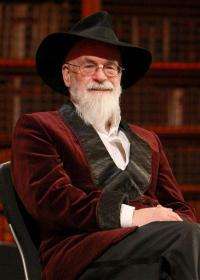Author Terry Pratchett defends right-to-die film

(AP) -- Writer Terry Pratchett said Tuesday that watching a man being helped to die had reaffirmed his support for assisted suicide, while anti-euthanasia groups criticized the televised death as propaganda.
The suicide, filmed for a BBC documentary, has reopened debate on Britain's decades-old law against helping another person end their life.
Pratchett watched Peter Smedley, a 71-year-old British businessman with motor neuron disease, take a lethal dose of barbiturates at a Swiss suicide clinic.
Best-selling fantasy author Pratchett was diagnosed with early onset Alzheimer's disease in 2007 and is a vocal supporter of the right to die.
He said he was moved by Smedley's death at a clinic run by the Dignitas group, broadcast Monday on BBC television.
"He said to me 'Have a good life.' And then he shook (my PA) Rob's hand and said 'Have a good life, I know I have,'" 63-year-old Pratchett told the broadcaster.
"The incongruity of the situation overtakes you. A man has died, that's a bad thing, but he wanted to die, that's a good thing."
Pratchett said he was ashamed that British people had "to drag themselves to Switzerland, at considerable cost, in order to get the services that they were hoping for."
Anti-euthanasia campaigners criticized the decision to show Smedley's death. The former Bishop of Rochester, Michael Nazir-Ali, called the program "propaganda on one side."
"I think an opportunity had been bypassed of having a balanced program - the thousands of people who use the hospice movement and who have a good and peaceful death, there was very little about them," Nazir-Ali told BBC radio.
The BBC denied bias, saying it was "giving people the chance to make their own minds up on the issue."
Assisted suicide is illegal and carries a maximum 14-year sentence in England and Wales, but few people have been prosecuted in recent years for helping friends or relatives die abroad.
After a series of legal test cases, the chief prosecutor last year drew up guidelines to clarify when criminal charges would be more or less likely.
Mitigating factors include a motive of compassion, evidence the victim had made a voluntary and informed decision to end their lives and evidence a suspect tried to talk the victim out of suicide.
In Switzerland, "passive assisted suicide" - giving another person the means to kill themselves - is legal provided the helper isn't a medical doctor and doesn't personally benefit from a patient's death.
©2011 The Associated Press. All rights reserved. This material may not be published, broadcast, rewritten or redistributed.
















